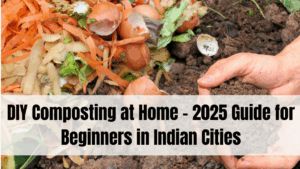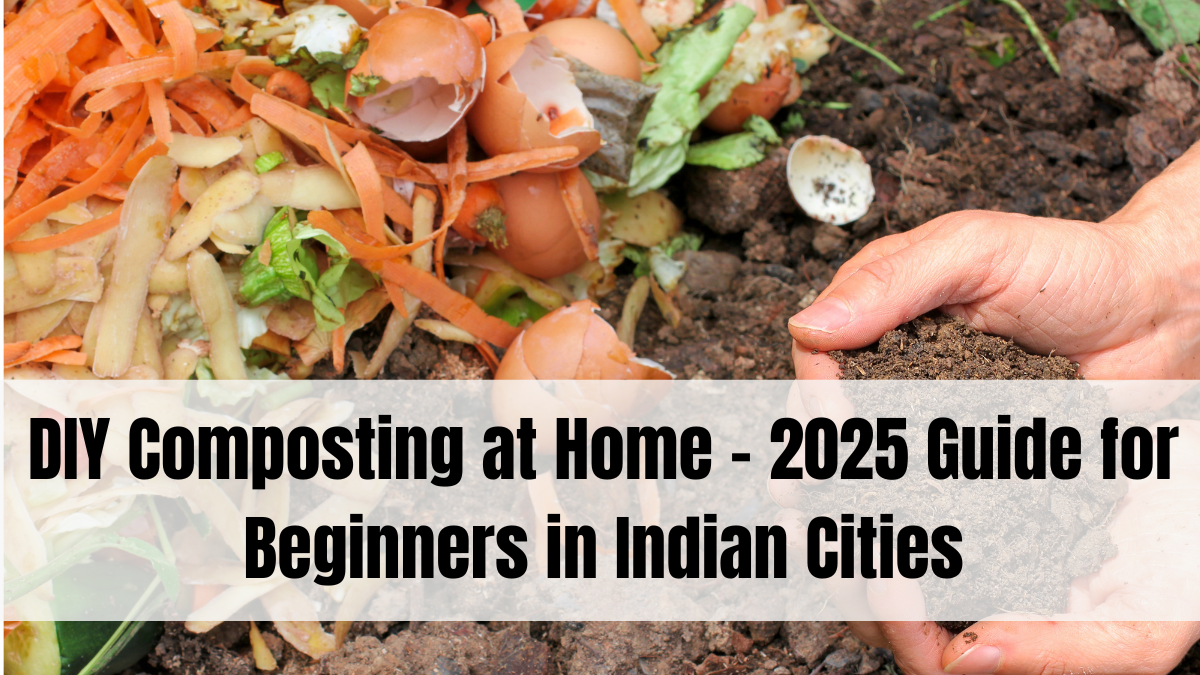With rising awareness about sustainability and waste reduction, home composting India 2025 is gaining momentum among urban households. Composting converts organic kitchen and garden waste into nutrient-rich soil, helping reduce landfill burden and promoting healthier plants and gardens.
This guide walks you through easy, practical composting methods perfect for Indian city homes, whether you have a balcony, terrace, or small garden.

Why Start Composting at Home?
Composting offers several benefits for city dwellers:
-
Reduces organic waste: Cuts down the volume sent to landfills, decreasing methane emissions.
-
Creates natural fertilizer: Improves soil health for potted plants, balconies, and gardens.
-
Saves money: Less reliance on chemical fertilizers and soil conditioners.
-
Promotes sustainability: Closes the nutrient loop by recycling kitchen scraps.
-
Educates families: Teaches eco-friendly habits to all household members.
For Indian urban homes, composting is a simple way to contribute to environmental well-being.
Types of Composting Suitable for Indian Homes
Depending on space and lifestyle, several composting methods work well in Indian settings:
-
Vermicomposting: Uses earthworms to break down organic waste rapidly; suitable for small spaces and balconies.
-
Pit Composting: Dig a small pit or trench in the garden or terrace; simple but requires some outdoor space.
-
Bucket Composting: A compact method using a lidded bin or bucket with aeration holes; ideal for apartments.
-
Tumbler Composting: A rotating bin that speeds up composting and is odor-free; needs slightly more space.
Choosing the right method depends on your available space, waste type, and effort level.
What Can You Compost at Home?
Safe materials include:
-
Fruit and vegetable peels
-
Coffee grounds and tea bags
-
Eggshells
-
Dry leaves and grass clippings
-
Paper towels and napkins (non-printed)
Avoid composting:
-
Meat, fish, and dairy products (attract pests)
-
Oils and greasy foods
-
Diseased plants or weeds with seeds
-
Pet feces or chemically treated plant material
Proper segregation ensures effective and odor-free composting.
Step-by-Step Beginner’s Composting Process
-
Select your compost bin or spot. Choose a container or area with good drainage and air flow.
-
Layer your waste. Alternate “green” wet waste (kitchen scraps) with “brown” dry waste (leaves, paper) to balance moisture and aeration.
-
Turn or aerate regularly. Use a garden fork or stick to mix the compost weekly to speed decomposition.
-
Maintain moisture. Keep the pile damp like a wrung-out sponge, adding water if too dry.
-
Harvest compost. After 2-3 months, the pile will turn dark, crumbly, and earthy smelling — your rich compost is ready to use.
Consistency is key for successful home composting.
Tools and Tips for Indian Urban Composters
-
Use locally sourced or affordable plastic/metal bins.
-
Place the bin away from direct sunlight to prevent drying out.
-
Use neem leaves or dry powders to control flies and odor.
-
Collect kitchen waste in a covered container before adding to compost.
-
Share surplus compost with neighbors or community gardens.
These simple practices make composting manageable and rewarding.
FAQs
What is home composting?
It’s the process of recycling organic household waste into nutrient-rich soil amendment at your own home.
Can I compost in a small apartment?
Yes, using vermicomposting or bucket composting methods suitable for limited space.
How long does composting take?
Typically 2-3 months, depending on conditions and waste types.
What should not be composted at home?
Avoid meat, dairy, oils, diseased plants, and pet waste to prevent pests and odors.
How can compost benefit my plants?
It improves soil structure, retains moisture, provides nutrients, and promotes healthy plant growth.
Click here to know more.
